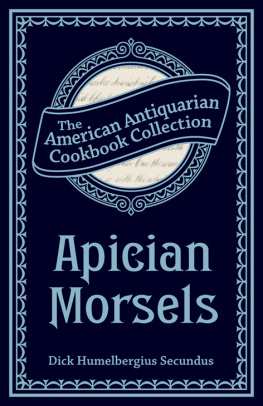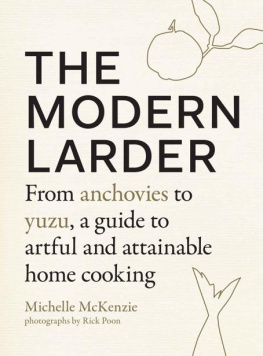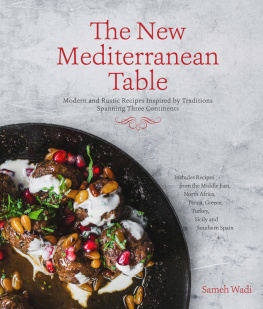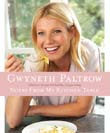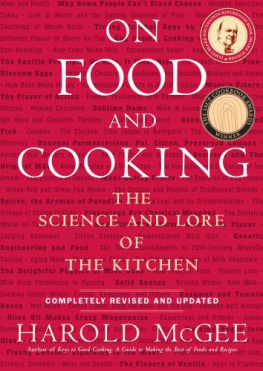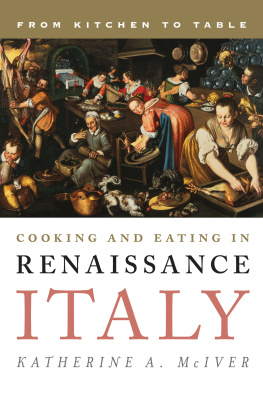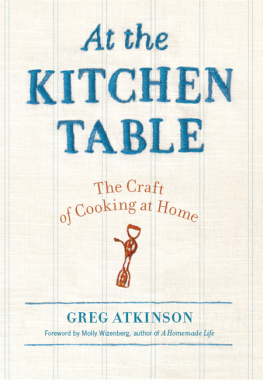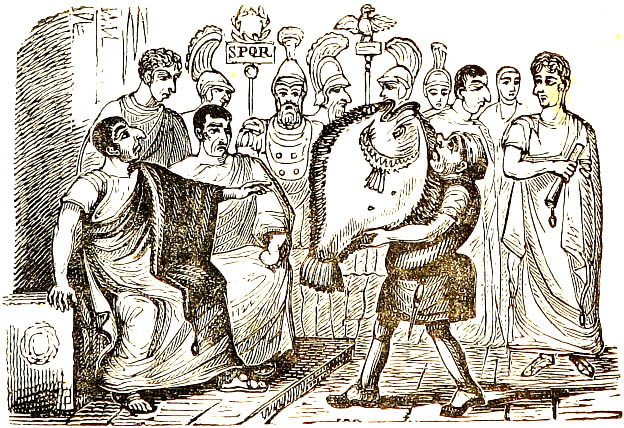
THE ROMAN SENATE DEBATING ON THE TURBOT.See p. 138.
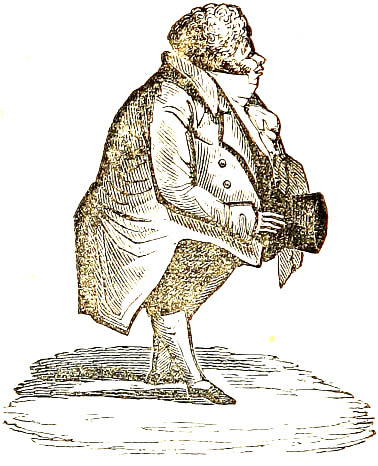
MR . EATINGTOWN IN THE ACT OF RECEIVING AX INVITATION FOR 5 OCLOCK very PRECISELY .See p. 96.


OTHER BOOKS IN
THE AMERICAN ANTIQUARIAN SOCIETY
COOKBOOK COLLECTION
1776-1876: The Centennial Cook Book and General Guide, by Mrs. Ella E. Myers
American Cookery, by Amelia Simmons
The American Family Keepsake, by The Good Samaritan
The Art of Dining, and the Art of Attaining High Health, by Thomas Walker
California Recipe Book, by Ladies of California
Canoe and Camp Cookery, by Seneca
The Canadian Housewifes Manual of Cookery
The Compleat Housewife, by Eliza Smith
The Cook Not Mad
The Cooks Own Book, and Housekeepers Register, by Mrs. N.K.M. Lee
Cottage Economy, by William Cobbett
Confederate Receipt Book
Dainty Dishes, by Lady Harriet E. St. Clair
Dairying Exemplified, by Josiah Twamley
De Witts Connecticut Cook, and Housekeepers Assistant, by Mrs. N. Orr
Every Ladys Cook Book, by Mrs. T. J. Crowen
Fifteen Cent Dinners for Families of Six, by Juliet Corson
The Frugal Housewife, by Susannah Carter
The Hand-Book of Carving
The Health Reformers Cook Book, by Mrs. Lucretia E. Jackson
The Housekeepers Manual
How to Mix Drinks, by Jerry Thomas
Jewish Cookery Book, by Esther Levy
Miss Leslies New Cookery Book, by Eliza Leslie
Modern Domestic Cookery, and Useful Receipt Book, by W. A. Henderson
Mrs. Hales New Cook Book, by Mrs. Sarah J. Hale
Mrs. Owens Illinois Cook Book, by Mrs. T.J.V. Owens
Mrs. Porters New Southern Cookery Book, by Mrs. M.E. Porter
The New Housekeepers Manual, by Catherine E. Beecher and Harriet Beecher Stowe
The New England Cook Book
The Practical Distiller, by John Wyeth
The Physiology of Taste, by Jean A. Brillat-Savarin
Seventy-Five Receipts for Pastry, Cakes, and Sweetmeats, by Eliza Leslie
The Times Recipes, by The New York Times
A Treatise on Bread, by Sylvester Graham
Vegetable Diet, by William Alcott
The Virginia Housewife, by Mary Randolph
What to Do with the Cold Mutton
The Young Housekeeper, by William Alcott

This edition of Apician Morsels by Dick Humelbergius Secundus was reproduced by permission from the volume in the collection of the American Antiquarian Society (AAS), Worcester, Massachusetts. Founded in 1812 by Isaiah Thomas, a Revolutionary War patriot and successful printer and publisher, the Society is a research library documenting the life of Americans from the colonial era through 1876. AAS aims to collect, preserve, and make available as complete a record as possible of the printed materials from the early American experience. The cookbook collection includes approximately 1,100 volumes.
Apician Morsels copyright 2013 by American Antiquarian Society. All rights reserved. No part of this book may be used or reproduced in any manner whatsoever without written permission except in the case of reprints in the context of reviews.
Andrews McMeel Publishing, LLC
an Andrews McMeel Universal company
1130 Walnut Street, Kansas City, Missouri 64106
www.andrewsmcmeel.com
ISBN: 9781449428785
ATTENTION: SCHOOLS AND BUSINESSES
Andrews McMeel books are available at quantity discounts with bulk purchase for educational, business, or sales promotional use. For information, please e-mail the Andrews McMeel Publishing Special Sales Department:
specialsales@amuniversal.com
CONTENTS.

APICIAN MORSELS, &c.

CHAPTER I.
DIETETIC TEMPERANCE, &c.

Temperance, that virtue without pride, and fortune without envy, gives indolence (healthfulness) of body, and tranquillity of mind; the best guardian of youth, and support of old age.Temples Essays.
I N an extended sense, temperance is synonymous with moderation, and may be recommended as a duty every man owes to himself in the exercise of all his affections and passions; and is here closely allied to prudence, which forbids the undue gratification of any desire whatever. In a restricted sense, it is that virtue which guards against those injuries our health is exposed to, by an excessive indulgence of our appetites in eating and drinking. Nature lays us under an obligation to eat and drink for the support of our bodily frame; and has endowed us with faculties and powers to choose and prepare that diet which is most salutary and agreeable to our tastes: the great danger we are exposed to is, that of consulting the latter quality rather than the former; and hence of being tempted to exceed the due measure requisite for subsistence.
Intemperance in eating and drinking loads the vessels with a redundancy of juices, increases the rapidity of the circulation, until a plethora corrupt the humours, and either carries off the miserable victims, by inflammatory disorders, in the prime of life, or sows the seeds of chronical infirmities, that accelerate the incapacities and distresses of old age before the natural term. All the arguments that are brought against suicide, whether by sword, pistol, or poison, hold good in some degree against intemperance. Who does not know, that the oftener a building is shocked, the sooner it will fall; the more violence used to a delicate machine, the sooner it will be destroyed; and no machine is so exquisitely delicate as the human body.
The principal vices repressed by temperance are incontinency, and excesses in eating and drinking: if there be any more, they flow from one or other of these causes. It would, at present, lead us to too great a length, to consider this virtue fully in both points of view. To the last, then, as more appropriate to our particular subject, we shall chiefly confine what further remarks we may have to offer on dietetic temperance.
Wine, says an eminent author, raises the imagination, but depresses the judgment. He that resigns his reason is guilty of every thing be is liable to in the absence of it. A drunken man is the greatest monster in human nature, and the most despicable character in human society; this vice has very fatal effects on the mind, the body, and fortune of the person who is devoted to it; as to the mind, it discovers every flaw in it, and makes every latent seed sprout out in the soul; it adds fury to the passions, and force to the objects that are apt to inflame them. Wine often turns the good-natured man into an idiot, and the choleric man into an assassin; it gives bitterness to resentment, makes vanity insupportable, and displays every little spot of the soul in its utmost deformity.
Next page
